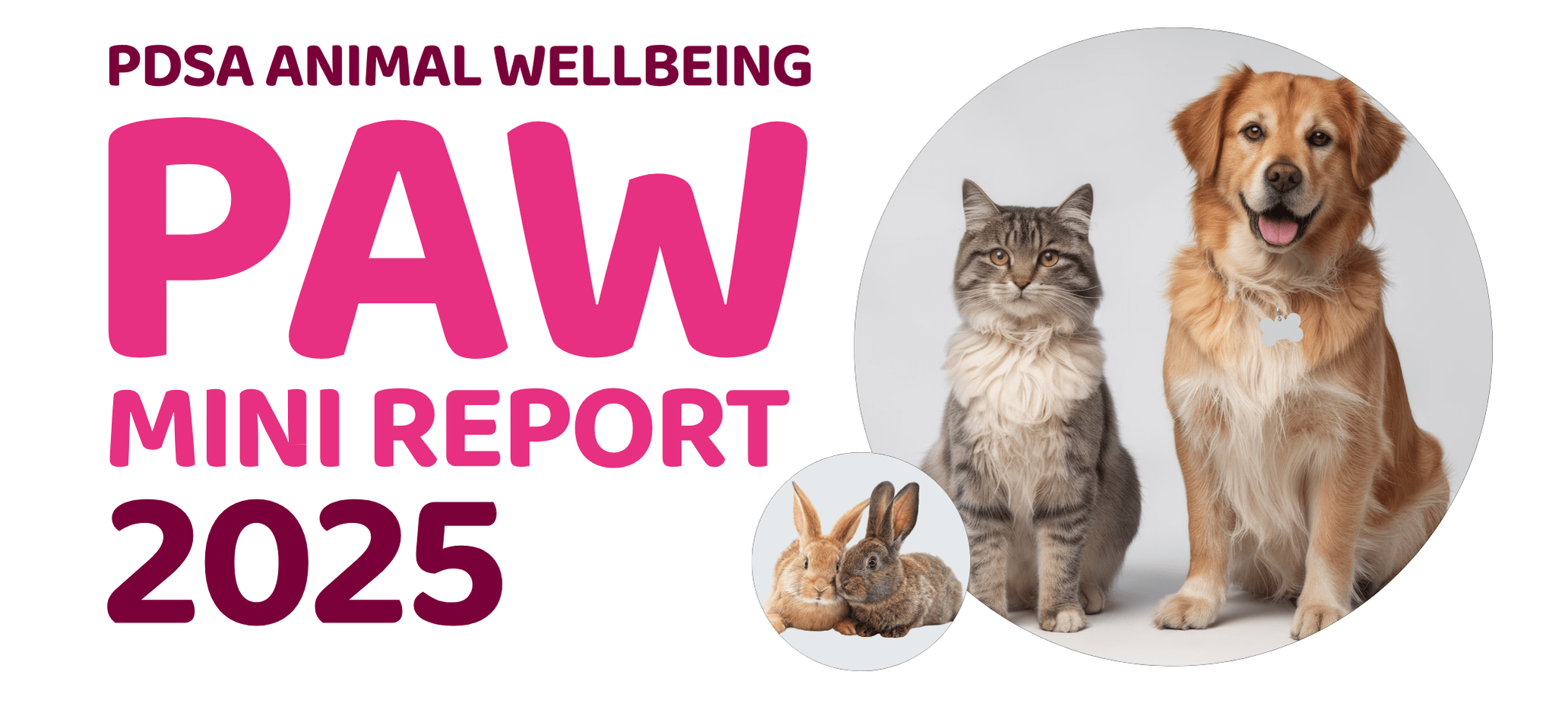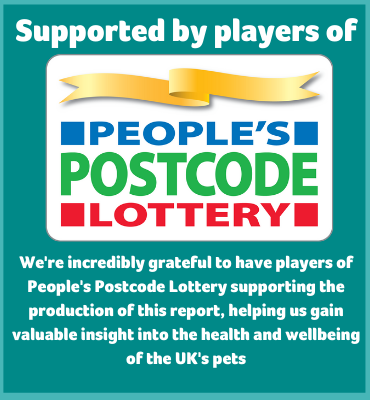The PDSA Animal Wellbeing (PAW) Report is the UK's largest annual assessment of pet wellbeing.
When the PAW Report launched in 2011, it became the first overarching means of identifying, assessing and monitoring the wellbeing of companion animals and how well their 5 Welfare Needs are being met. While the introduction of the Animal Welfare Acts in 2006 placed a legal 'duty of care' for all pet owners to meet their pet's Welfare Needs, there was no accompanying Government surveillance, and therefore, before the PAW Report, no means of knowing if this was being achieved on a nationwide scale.
Each year PDSA works with leading market research company, YouGov, to survey nationally representative samples of pet dog, cat and rabbit owners, providing insight into animal welfare issues, estimating pet population numbers, and understanding how people care for their pets. Over the years, our vital research has found that millions of UK pets are not having these needs appropriately met.
15 years of data gives us unrivalled insight to track the changing trends of how well owners provide for their pets’ 5 Welfare Needs benchmarked against the UK Animal Welfare Acts.
Over 105,000 pet owners, vets, vet nurses and children surveyed since 2011
Key findings from PDSA Animal Wellbeing Mini Report 2025
The PDSA Animal Wellbeing (PAW) Report provides a detailed view of how pets are cared for across the UK, with a focus on the Five Welfare Needs. Since 2011, the Report has used a consistent and validated methodology to track trends in pet populations, acquisition behaviours, and the wider context of pet ownership, offering valuable insights into the evolving landscape of animal welfare.
This year, we are launching a PAW Mini Report. Still the same trusted PAW Report that has been running since 2011, but presented in a more condensed version for 2025. We’ve continued collecting data through a nationally representative survey of dog, cat, and rabbit owners, and these findings provide an in-depth insight into the UK’s pet populations and how they’re cared for.
This year’s PAW Mini Report highlights both progress and ongoing challenges.
In 2025, the UK’s estimated dog population reached a record high, while the number of pet rabbits continues to decline. Acquisition behaviours remain a key focus, with many owners choosing not to visit a pet more than once before bringing them home. The data also reveals the growing influence of social media on pet acquisition decisions.
The ongoing cost of living continues to put pressure on pet owners. More than half say they are worried about affording veterinary care, and a growing proportion are not accessing essential services such as regular vaccinations and microchipping, particularly among those facing financial hardship.
Other areas of concern include rabbits being fed inappropriate diets and housed alone, despite being social animals, as well as continued reports of mutilations in dogs, such as cropped ears and docked tails. Awareness of pet first aid is mixed: overall, three in ten think they know how to give emergency pet first aid, but when asked about specific scenarios, most don’t know what to do.
Despite these challenges, the data also shows that the emotional value of pets remains clear: many owners say that their pets improve their mental health, provide companionship, and offer vital support during difficult times.
These findings provide evidence-based results, allowing us to identify emerging trends and early indicators of pet welfare issues. They enable us to monitor and safeguard the wellbeing of the nation's pets and work with others across the sector to drive positive change.
Antibiotic Stewardship Report
In 2023, our PAW Report survey included questions about antibiotic stewardship, providing insight into the perceptions of both pet owners and veterinary professionals about this important issue.
The issue of antibiotic usage and resistance in companion animals is of significant concern both globally and within the UK. Antibiotics are essential in both veterinary and human medicine but their use, whether appropriate or not, creates a powerful selection pressure on bacteria and is the primary cause of antibacterial resistance, posing a serious threat to both animal and human health. Eliminating unnecessary use in people and animals is essential to safeguard antibiotics for the future.
PDSA is committed to antimicrobial stewardship and has produced protocols focused on this area in recent years, achieving demonstrable reductions in antimicrobial use across its network of Pet Hospitals, while still optimising patient outcome.
This report provides an overview of the work PDSA has done to reduce antibiotic use, alongside exploring the initiatives and collaborative efforts taken by organisations like the Responsible Use of Medicines Alliance, Companion Animals & Equine (RUMA, CA&E) to improve antimicrobial stewardship and ensure the continued responsible use of antibiotics in veterinary medicine.
Why does PDSA produce the PAW Report?
The purpose of the PAW Report is to provide an in-depth analysis of current welfare issues and overall pet wellbeing in the UK. This provides an evidence-base, and impact measure, for any activities or initiatives which tackle these issues, both for us and for those we work with from the veterinary profession and across the animal welfare sector, to local, devolved and central Government.
PDSA works alongside researchers and students to make PAW Report data available for studies on selected relevant topics, bringing additional animal welfare benefit through further research.
Please get in touch if we can help with anything specific.
The PAW Report’s years of monitoring and tracking trends in pet welfare in the UK has been peer-reviewed and published in the Vet Record. ‘Driving evidence‐based improvements for the UK's ‘Stressed. Lonely. Overweight. Bored. Aggressive. Misunderstood…but loved’ companion animals’ (Wensley et al, 2021) is available via open access.
A nation of animal lovers
Many problems seen by animal welfare organisations across the UK are entirely preventable. 91% of owners tell us that owning a pet improves their life, but despite being a nation of animal lovers, who love their pets and treat them as valued family members, the PAW Report continues to show that many owners misunderstand their pet’s Welfare Needs which can impact on their long-term health and wellbeing.
Pet owners need support, and the PAW Report highlights the areas that need to be targeted to drive positive change. It’s essential that we continue to work towards understanding and overcoming the barriers owners have to providing the care that pets require, and helping them learn about how to take care of their pets, especially at a time with so many competing voices. The veterinary profession and the wider animal welfare community have a vital role to play in using both empathy and evidence-based information to guide owners to help them improve their pet’s wellbeing.
Working with pet owners, the veterinary profession and fellow animal welfare organisations, together we can make a better life for all our pets.


